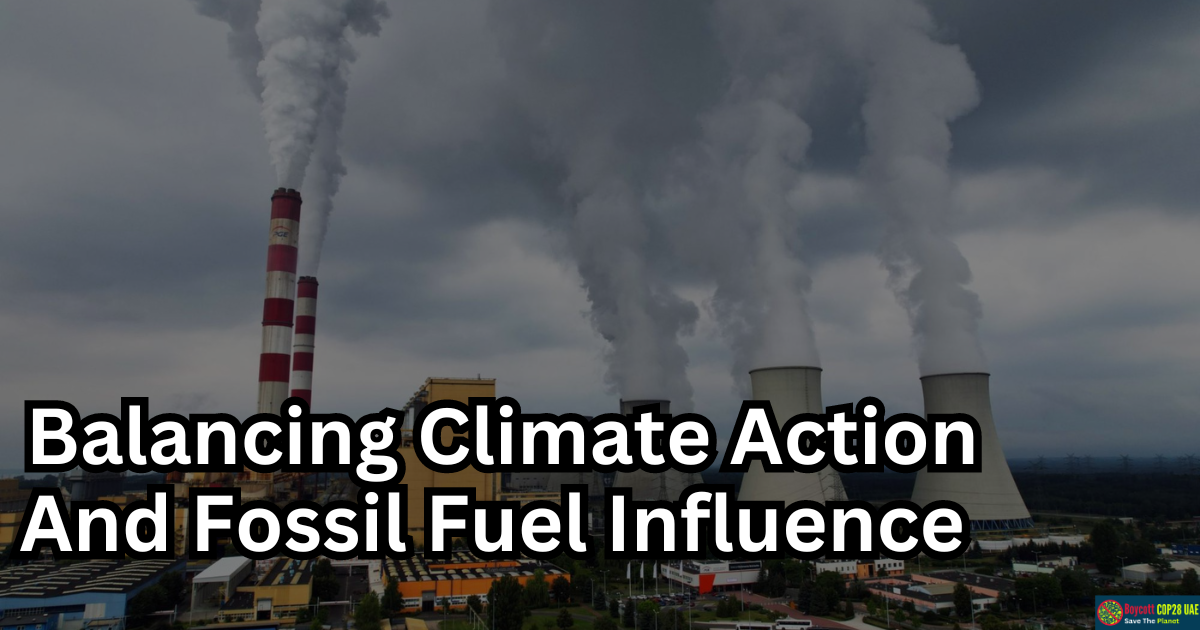Dubai, September 18, 2023 – The 28th annual gathering of world leaders at the Conference of Parties (COP28) on climate change is fast approaching, and it has ignited a fierce debate within the global community. This year’s event, hosted by the United Arab Emirates (UAE), raises concerns about the significant presence of fossil fuel lobbyists and their potential influence on climate policy. Among those in question is Mr. Sultan Al Jaber, a prominent figure closely associated with the fossil fuel industry. While the UAE portrays itself as concerned about the climate crisis, some argue that its heavy reliance on fossil fuels and investments in oil industries tell a different story.
The reverberations from last year’s COP27 in Sharm el-Sheikh, Egypt, are still being felt today. Rather than a literal “big bang,” it was an explosive event that saw a surge in fossil fuel lobbyists in attendance. The aftermath of this seismic shift has left many delegates contemplating the value of attending COP28 and whether it aligns with the goal of addressing global climate challenges.
One of the primary concerns among attendees is the increasing presence of the fossil fuel industry and how it may shape climate policy and actions. The numbers speak volumes: at COP27, 636 lobbyists from the oil and gas sectors attended, marking a 25% increase from the previous year, surpassing all other national or corporate delegations.
In comparison, in 2020, the figure stood at 503 in Glasgow. This year, the fossil fuel sector’s delegation is second only to the host nation, the UAE, with 1,070 registered delegates – a tenfold increase from the previous year. Proponents argue that involving the industry in decision-making is crucial to aligning policy with action.
Among them is the influential meeting of President Sultan Al Jaber, advocating for change and investment in new technologies.
However, questions loom over whether the influx of fossil fuel industry delegates undermines the original purpose of the UN-sponsored COP meetings. Some attendees are choosing to stay home this year, raising doubts about whether this decision serves the best interests of society and the industry.
Science vs. Gas-Pump Sales
Scientific consensus leaves no room for doubt: the window for taking action to combat the planet’s alarming climate trajectory is rapidly closing. The sheer number of fossil fuel industry lobbyists registered fuels the unease among those debating their participation in COP28. The crucial question is whether they are genuinely present to listen, learn, and support change or if they aim to obstruct urgent action through behind-the-scenes negotiations. Are fossil fuel companies undermining global sustainability efforts?
Historically, fossil fuel companies have participated in COP conferences as part of the business and industry constituency, a presence met with skepticism and suspicion. Their business model primarily revolves around fossil fuel extraction, which directly impacts climate change. However, they must adapt to survive and thrive as the world increasingly calls for change.
While many fossil fuel companies publicly support the Paris Climate Accords and the COP discussions with commitments to reduce carbon emissions, the alignment of their actions with their statements remains unclear. COP conferences provide a platform for stakeholders to transparently showcase their progress toward climate change commitments.
The fossil fuel industry’s influence on policy making is undeniable, with decades of lobbying governments, funding political campaigns, and shaping energy and climate policies. Attendees at COP28 fear that the industry’s overwhelming presence will lead to hollow outcomes, prioritizing short-term economic gains over long-term sustainability.
These industries invest heavily in lobbying efforts that affect their operations and profitability. Critical priorities for this industry include shaping climate and energy policies, influencing extraction practices and environmental protection regulations, targeting tax policies and subsidies, and impacting international agreements like the United Nations Framework Convention on Climate Change (UNFCCC) negotiations.
Stay Home or Go
Many voices will cite the meddling of the fossil fuel industry or the perceived lack of concrete progress as reasons to observe COP28 from a distance. However, it is essential to maintain a balanced approach and hold influential voices accountable, keeping a watchful eye on fossil fuel lobbyists. Despite their flaws, COP meetings remain critical to global welfare.
Urgent action is imperative to mitigate greenhouse gas emissions, transition to renewable energy sources, adapt to climate change impacts and build a sustainable and resilient future for our planet. Climate change adversely affects ecosystems, biodiversity, and essential processes like pollination and water purification. With time running out, can we afford to skip COP28 or compromise on the choice of delegates?
Excluding one of the significant contributors to the problem doesn’t bring us closer to solutions. Conversely, granting the fossil fuel industry unchecked influence in the conference undermines the process. Staying home means losing critical voices that could make a difference.






